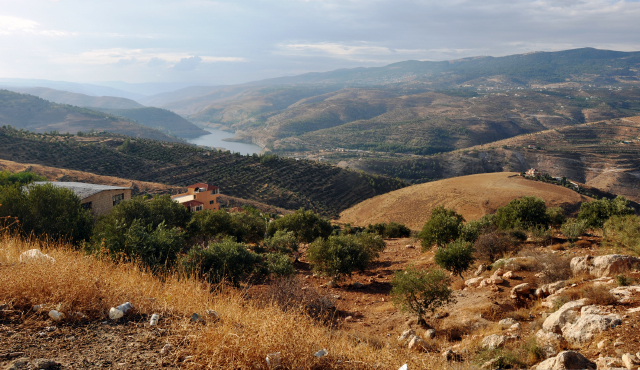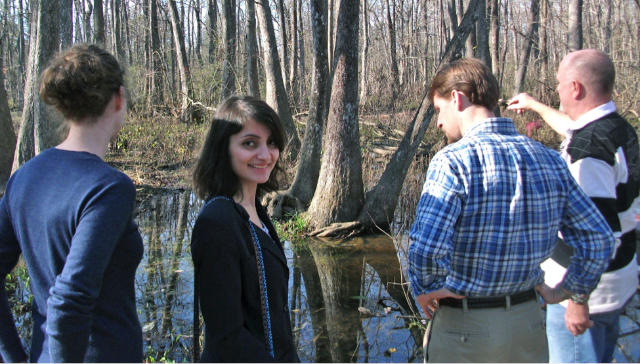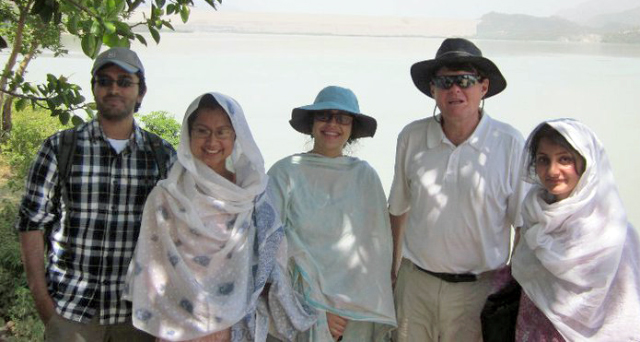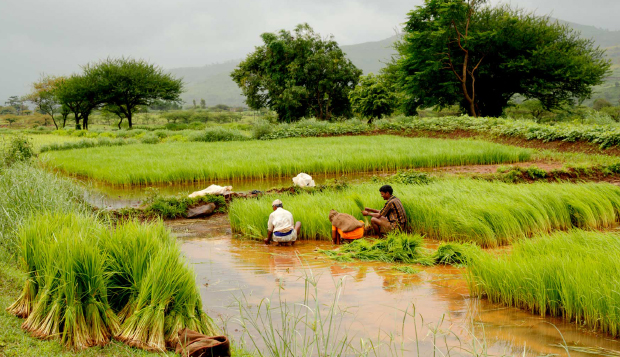At international sustainability organization, alumna offers fresh ideas for cleaner water
The Zarqa River in Jordan has become so polluted by raw sewage and agricultural and industrial waste that the river, a critical resource in this arid nation, carries a sickly, brownish hue. Treatment plants are consistently overloaded, and despite clear negative impacts on health and the environment, illegal dumping continues.
What the Zarqa River Basin needs is a new approach to environmental remediation, according to alumna Laila Kasuri, A.B. ’13, an environmental science and engineering concentrator at the Harvard John A. Paulson School of Engineering and Applied Sciences (SEAS). Kasuri co-leads a team at the Global Green Growth Institute that is working with Jordanian officials to establish a master plan for developing the Zarqa River Basin, which includes setting up free trade zones, developing tech firm hubs, and promoting local sustainable economic initiatives. These will result in economic revival of the region, while meeting the ultimate goal of improving water quality and water resource management, Kasuri said.
“We are trying to go beyond water through this solution. Degraded environmental quality is often a symptom, not a cause,” she said. “If people are still suffering from the same poor economic conditions, they are going to keep polluting the river. Building another treatment plant won’t really solve the problem. It will be solved by investing in people, educating them, and encouraging them to value and care for the river and their natural resources.”

The Zarqa River, a 40-mile-long tributary, flows through a deep and broad valley into the Jordan River.
This unique approach to water quality and water resource management is the crux of GGGI, an inter-governmental organization headquartered in Seoul, South Korea, that partners with developing nations to design programs that demonstrate new pathways towards green growth. Kasuri, who recently joined the organization as a water policy solutions analyst, leads projects all over the world.
Her interest in water flows back to her experiences as a Harvard undergrad; during a lecture by Gordon McKay Professor of the Practice of Environmental Engineering John Briscoe, she became so inspired that she traveled to Pakistan to work alongside Briscoe on a water resources development project funded by the Asian Development Bank.
“For the first time, I saw the political aspects of water and how there are many different stakeholders involved, while simultaneously learning about many technicalities of water resources management,” she said.
After receiving a research fellowship, Kasuri applied those skills in a vastly different environment—the deeply rooted communities that line the lower Mississippi River.
She worked on hydraulic modeling projects with the U.S. Army Corps of Engineers along the heavily leveed Lower Mississippi reaches that are prone to frequent flooding. Driving through the poor, yet colorful rural communities that crowd the riverbank between Memphis and New Orleans provided a fascinating cultural case study for Kasuri, a native Pakistani.
“I find it fascinating how people are engaging with water and how they find solutions to manage it,” she said. “Along the Mississippi, people have a strong relationship with the river as an environmental force; it carries an almost magical quality. By contrast, in the Indus Basin, the river is seen as an economic resource; the environmental value is often not even considered.”

Kasuri examines the Atchafalaya Swamps, along the Mississippi River in Louisiana, during an internship with the Army Corps of Engineers. (Photo provided by Laila Kasuri.)
After earning a master’s degree in civil and environmental engineering at the University of California at Davis, Kasuri accepted a position at the World Bank. She worked on a flood embankment project in the Brahmaputra River Basin in Bangladesh, a frequently flooded river basin that is among the most vulnerable to the effects of climate change.
From there, Kasuri returned to Pakistan, where she helped launch The Center for Water Informatics and Technology at Lahore University of Management Sciences, and taught a university course focused on the multitude of factors involved in water resources management. Writing grants and inking business deals posed a unique challenge, but with the research center soon running smoothly, she embarked on a new adventure at GGGI.

Kasuri (right) stands with a group along the banks of the Indus River in Pakistan during a tour of the Ghazi Barotha Power Plant. (Photo provided by Laila Kasuri.)
In addition to her work in Jordan, Kasuri leads a project in India to provide rural farmers with energy-efficient solar-powered irrigation pumps, which encourage water and energy conservation by improving efficiency and incentivizing farmers to pump less water through energy buyback schemes. The project also generates a reliable source of power for India’s strained and unreliable grid. She is also co-leading a project in Vietnam to explore the establishment of a comprehensive index-based climate insurance program for farmers to insure them against losses due to extreme events such as flooding or drought, which often devastate the region.
These unique approaches to sustainable water resources management appeal to Kasuri’s creative side, while the opportunity to help protect the environment and improve the lives of people around the world is extremely gratifying.
“The biggest lesson I have learned is to be open to different points of view,” she said. “I started out being focused solely on preservation, but over time I’ve seen that different people have different needs. I don’t think there is one right answer to the problem of water quality management. In any environmental solution, it is critical to find balance, keep listening, and continue learning from the people around you.”

Farmers work in a rice paddy in rural India. (Photo by Ramnath Bhat/Wikimedia Commons.)